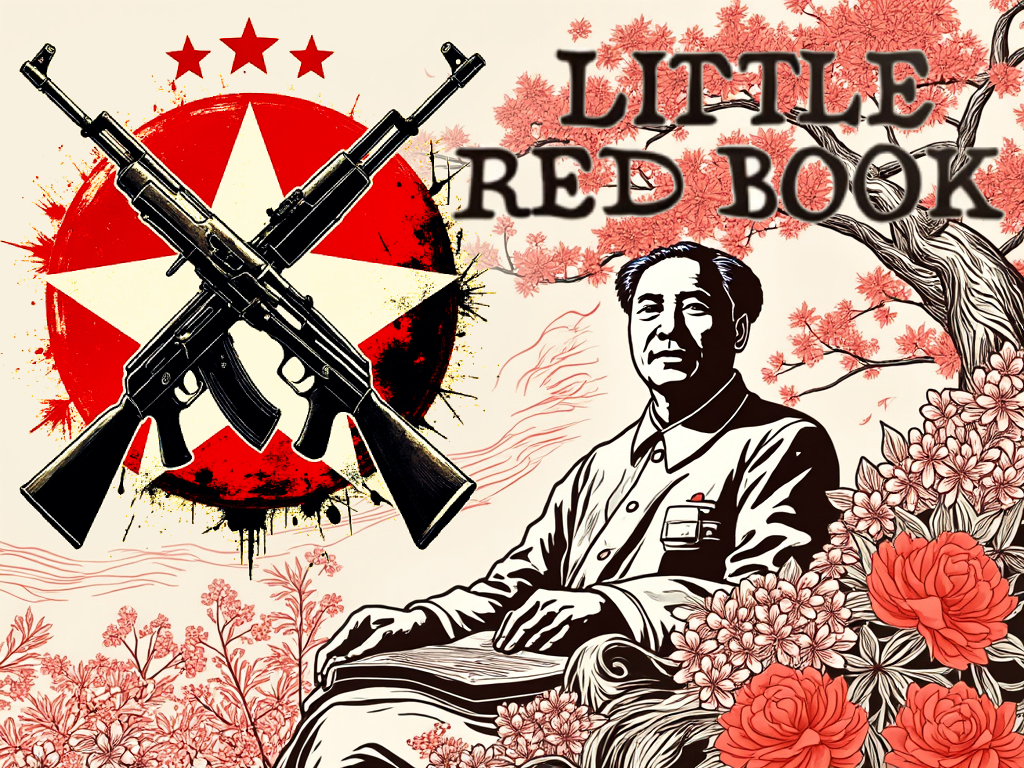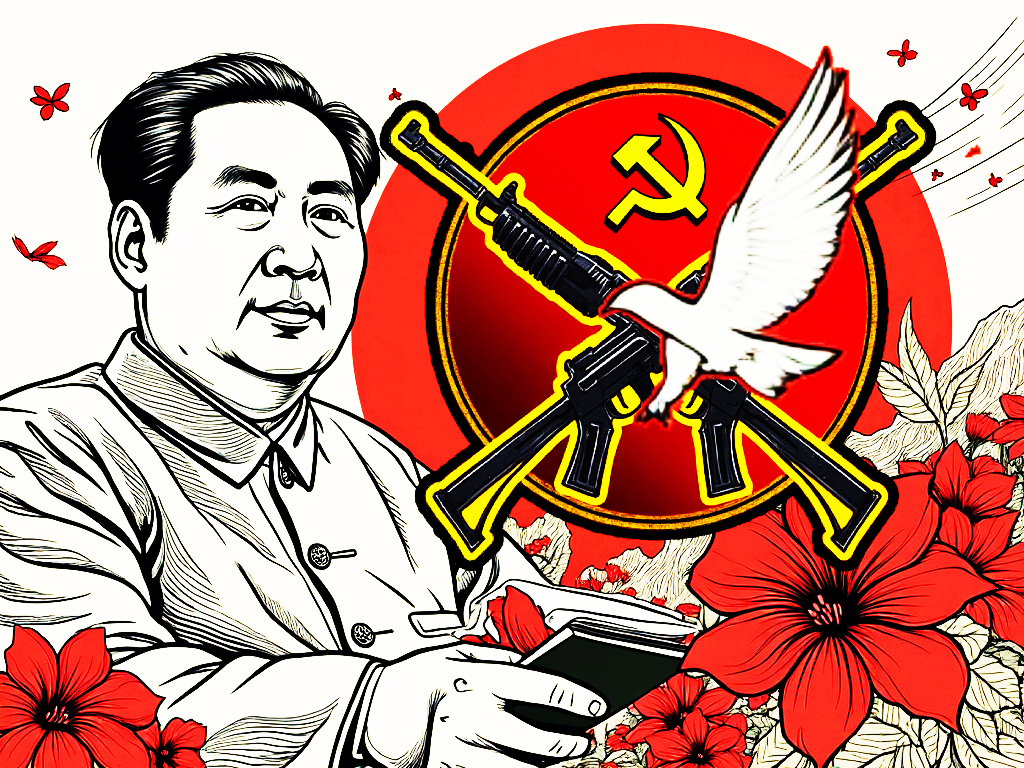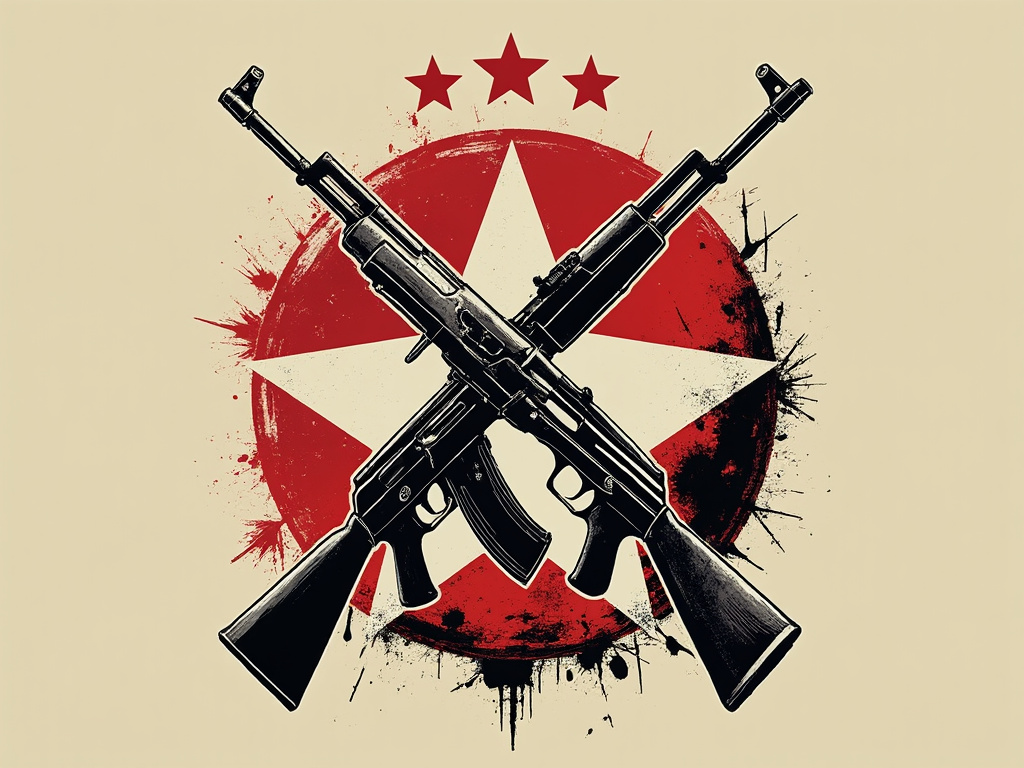
✤ ✪ ✤ ✪ ✤ ✪ ✤ ✪ ✤ ✪ ✤ ✪ ✤ ✪ ✤ ✪ ✤ ✪ ✤
Mao's Crimson Legacy: The Rise and Retreat of the Little Red Book
✤ ✪ ✤ ✪ ✤ ✪ ✤ ✪ ✤ ✪ ✤ ✪ ✤ ✪ ✤ ✪ ✤ ✪ ✤
Commies, marching with Orwellian lockstep and perfect double-think, no longer speak about their former favorite totalitarian text. Mao's "Little Red Book," officially titled "Quotations from Chairman Mao Tse-tung," emerged during the Cultural Revolution in China, becoming one of the most printed books in history. First published in 1964, it was intended to be a guide for the Red Guards, the youth mobilized by Mao Zedong to purge the country of what he considered impure elements of Chinese society and to revive the revolutionary spirit.
Top Ten Quotes from the Little Red Book:
Political Power and the Gun: "Political power grows out of the barrel of a gun." This quote underscores Mao's belief in the necessity of armed struggle to achieve political change.
Class Struggle: "Classes struggle, some classes triumph, others are eliminated. Such is the history of civilization for thousands of years."
Revolutionary Heroism: "A revolution is not a dinner party... It cannot be so refined, so leisurely and gentle... A revolution is an insurrection, an act of violence by which one class overthrows another."
Serving the People: "Our duty is to hold ourselves responsible to the people. Every word, every act, and every policy must conform to the people's interests."
Self-Reliance: "Rely on your own efforts." This reflects Mao's push for China's self-sufficiency and independence in economic and political spheres.
War and Peace: "War is the continuation of politics by other means." Here, Mao interprets war through a political lens, emphasizing its strategic use.
The Mass Line: "From the masses, to the masses." This principle involves leaders taking ideas from the masses, refining them with Marxist principles, and then propagating them back to the masses.
Women's Rights: "Women hold up half the sky." Mao advocated for gender equality, recognizing women's role in society and revolution.
Study: "To read too many books is harmful." Interestingly, Mao emphasized practical experience over extensive theoretical study, though this quote is often seen as an encouragement to critically engage with literature.
Youth: "The young people are the most active and vital force in society." Mao saw the youth as the vanguard of his revolutionary ideals.
Banning of the Little Red Book in China:
After Mao's death in 1976 and the end of the Cultural Revolution, China underwent significant reforms under Deng Xiaoping. The "Little Red Book," once a symbol of Mao's omnipresence in Chinese life, began to lose its revered status. Here's why it faced an informal ban:
Shift in Ideology: Deng Xiaoping's reforms emphasized economic development and opening up to the world, starkly contrasting with Mao's focus on class struggle. The book's content was seen as promoting ideas that were no longer in line with the new Chinese economic policies.
Cult of Personality: Post-Mao leadership aimed to dismantle the personality cult around Mao. The widespread distribution and mandatory study sessions of the "Little Red Book" were part of this cult, which the new leadership wanted to diminish to stabilize and modernize China.
Cultural Revolution Reevaluation: The horrors and chaos of the Cultural Revolution led to a reevaluation of Mao's policies. The book, as a symbol of that era, was quietly withdrawn from circulation to distance the Party from past excesses.
Educational Shift: Education systems reformed to focus on science, technology, and practical skills rather than ideological purity, making Mao's quotes less relevant.
While not officially banned, the "Little Red Book" became less visible in public life, its quotes no longer taught as unassailable truths but rather as historical texts. The shift reflects China's complex relationship with Mao's legacy: acknowledging his role in founding the People's Republic while moving away from his more radical ideologies to embrace a form of market socialism. This nuanced approach allows for the preservation of Mao as a national figure, while critically engaging with his ideas, which is evident from discussions found on platforms like X, where varied interpretations and critiques of Mao's teachings continue to evolve.
✤ ✪ ✤ ✪ ✤ ✪ ✤ ✪ ✤ ✪ ✤ ✪ ✤ ✪ ✤ ✪ ✤ ✪ ✤

✤ ✪ ✤ ✪ ✤ ✪ ✤ ✪ ✤ ✪ ✤ ✪ ✤ ✪ ✤ ✪ ✤ ✪ ✤
"Mao's Little Red Book," serves as a condensed guide to the principles of Chinese Communism during the Cultural Revolution. Here's how this text, and the broader context of its application, can be seen as exposing the fundamental flaws of communism, thereby inadvertently highlighting the merits of capitalism:
**1. The Glorification of Struggle and Violence: Mao's writings often emphasize class struggle as a continuous fight, which in practice led to widespread violence. The notion that political power grows out of the barrel of a gun, one of Mao's famous quotes, encapsulates the acceptance, if not promotion, of violence as a means to achieve political ends. This approach contrasts sharply with capitalist societies where, ideally, economic competition replaces physical conflict, and power is negotiated through market dynamics and democratic processes rather than violent revolution.
**2. Suppression of Individual Freedom: The Little Red Book advocates for the subservience of individual interests to the collective will, which, in Mao's China, was interpreted and dictated by the Communist Party. This principle led to severe restrictions on personal freedoms, entrepreneurship, and innovation, which are cornerstones of capitalist societies. Critics argue that capitalism, by fostering individualism, allows for personal and economic freedoms that were notably absent under Mao's regime.
**3. Economic Mismanagement: While not directly from the Little Red Book, the policies derived from Maoist thought, like the Great Leap Forward, resulted in economic disaster, including one of the deadliest famines in history. This contrasts with capitalist economies where the market determines production, often (though not always) leading to more efficient resource allocation. The failure of these collectivist economic policies underscores the critique that central planning, a feature of Mao's communism, cannot match the market's invisible hand in managing economic affairs effectively.
**4. Demagoguery and Lack of Accountability: Mao's Little Red Book helped foster a cult of personality around Mao, which is often criticized for creating an environment where leadership was beyond reproach, leading to tyrannical rule. In contrast, capitalist democracies typically have checks and balances, with leaders accountable to the law and the electorate, preventing such unchecked power.
**5. The Crushing of Ego and Brainwashing: Mao emphasized self-criticism as a method of ensuring ideological purity, which in practice was used to quash dissent and enforce conformity. This can be contrasted with the open market of ideas in capitalist societies, where debate and diverse viewpoints are encouraged, not through coercion but through the competition of ideas.
However, it's worth mentioning, in discussing these points, one can argue that the extreme control, violence, and economic failures associated with Mao's interpretation of communism provide a stark contrast to the principles of capitalism, particularly those emphasizing individual freedom, economic choice, and competitive markets. However, this discussion often enters the realm of comparing real-world implementations rather than theoretical ideals.
✤ ✪ ✤ ✪ ✤ ✪ ✤ ✪ ✤ ✪ ✤ ✪ ✤ ✪ ✤ ✪ ✤ ✪ ✤

✤ ✪ ✤ ✪ ✤ ✪ ✤ ✪ ✤ ✪ ✤ ✪ ✤ ✪ ✤ ✪ ✤ ✪ ✤

Daily Eagle News
http://dailyeagle.news
Established July 4, 2019